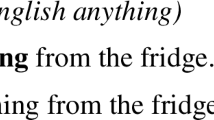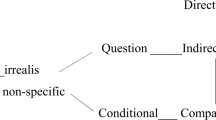Abstract
In this paper I provide a decompositional analysis of three kinds of plural indefinites in two related languages, European Spanish and Brazilian Portuguese. The three indefinites studied are bare plurals, the unos (Spanish)/uns (Portuguese) type, and the algunos (Spanish)/alguns (Portuguese) type. The paper concentrates on four properties: semantic plurality, positive polarity, partitivity, and event distribution. The logic underlying the analysis is that of compositionality, applied at the subword level: as items become bigger in form (with the addition of morphemes), they also acquire more semantic properties. The paper proposes the “indefinite hierarchy", which establishes a set of components for languages to build their indefinites with, in a particular order.
Similar content being viewed by others
References
Alonso-Ovalle, L., & Menéndez-Benito, P. (2002). Two types of weak quantifiers: Evidence from Spanish. In Proceedings of the 1st North American Summer School in Logic, Language and Information, pp. 11–19. Stanford, CA.
Baker C.L. (1970). Double negatives. Linguistic Inquiry 1, 169–186
Chierchia, G. (2004). Scalar implicatures, polarity phenomena and the syntax/pragmatics interface. In A. Belletti (Ed.), Structures and beyond (pp. 39–103). Oxford: Oxford University Press.
Chung S., Ladusaw B. (2004). Restriction and saturation. Cambridge, MA, MIT Press
Contreras, H. (1996). Sobre la distribución de los sintagmas nominales no predicativos sin deter- minante. In I. Bosque (Ed.), El sustantivo sin determinación. La ausencia de determinante en la lengua española (pp. 141–168). Madrid: Visor Libros.
Gutiérrez-Rexach, J. (1999a). Group indefinites. Proceedings of WCCFL, 17, 250–264.
Gutiérrez-Rexach, J. (1999b). Spanish indefinites and type-driven interpretation. In J.-M. Authier, B. Bullock, & L. Reed (Eds.), Formal perspectives on romance linguistics, (pp. 151–166). Amsterdam: John Benjamins.
Gutiérrez-Rexach J. (2001). The semantics of Spanish plural existential determiners and the dynamics of judgment types. Probus 13, 113–154
Gutiérrez-Rexach J. (2004). La semántica de los indefinidos. Madrid, Visor Libros
Haspelmath M. (1997). Indefinite pronouns. Oxford, Clarendon Press
Jespersen, O. (1909–1949). A modern English grammar on historical principles. London: George, Allen and Unwin.
Kadmon, N., Landman, F. (1993). Any. Linguistics and Philosophy, 16, 353–422.
Kroch A. (1979). The semantics of scope in English. New York, Garland
Laca, B. (1996). Acerca de la semántica de los plurales escuetos del español. In I. Bosque (Ed.), El sustantivo sin determinación. La ausencia de determinante en la lengua española (pp. 241–268). Madrid: Visor Libros.
Ladusaw B. (1980). Polarity sensitivity as inherent scope relations. New York, Garland
Landman F. (2000). Events and plurality. Dordrecht, Kluwer
Link, G. (1983). The logical analysis of plurals and mass terms: A lattice-theoretical approach. In R. Bauerle et al. (Eds.), Meaning, use and interpretation of language (pp. 303–323). Berlin: de Gruyter.
Lois, X. (1996). Los grupos nominales sin determinante y el paralelismo entre la oración y la frase nominal. In I. Bosque (Ed.), El sustantivo sin determinación. La ausencia de determinante en la lengua española (pp. 201–238). Madrid: Visor Libros.
Martí, L. (to appear). Contextual restrictions on indefinites: Spanish algunos vs. unos. Manuscript, CASTL/Universitetet i Tromsø. Downloadable at http://ling.auf.net/lingBuzz/000230. In A. Giannakidou & M. Rathert (Eds.), Proceedings of the Workshop on QP Structure, Nominalization and the Role of DP. Oxford: Oxford University Press.
Martí L. (2007). Restoring indefinites to normalcy: An experimental study on the scope of Spanish algunos. Journal of Semantics 24, 1–25
Masullo, P. (1996). Los sintagmas nominales sin determinante: una propuesta incorporacionista. In I. Bosque (Ed.), El sustantivo sin determinación. La ausencia de determinante en la lengua española (pp. 169–200). Madrid: Visor Libros.
McNally L. (2004). Bare plurals in Spanish are interpreted as properties. Catalan Journal of Linguistics 3, 115–133
Müller A. (2002). Genericity and the denotation of common nouns in Brazilian Portuguese. DELTA 18, 287–308
Nilsen Ø. (2004). Domains for adverbs. Lingua 114, 809–847
Schwarzschild R. (1996). Pluralities. Dordrecht, Kluwer
Szabolcsi A. (2004). Positive polarity–negative polarity. Natural Language and Linguistic Theory 22, 409–452
vanden Wyngaerd G. (1999). Positively polar. Studia Linguistica 53, 209–226
Villalta, E. (1994). Plural indefinites in Spanish and distributivity. Manuscript, CNRS.
Author information
Authors and Affiliations
Corresponding author
Additional information
Many thanks to my informants: Ana Paula Quadros, Cilene Rodrigues, Elaine Grolla, Fernanda Pratas, Isabel Pérez, Silvia Gumiel, Pilar Pérez, and Antonio Fábregas. Many thanks to Isabel and Ana Paula for discussing many aspects of this material with me. Thanks to Urtzi Etxeberria, Anastasia Giannakidou, and Arnim von Stechow for comments on an earlier version of the paper. Klaus Abels has spent many hours with me discussing the contents of this paper and providing not only very valuable feedback but also some needed encouragement. Thanks to audiences at the 16th Colloquium on Generative Grammar (especially Luis Eguren and Carlos Piera), Sinn und Bedeutung XI (especially Malte Zimmermann and Sigrid Beck), Universität Leipzig (especially Olav Müller-Reichau and Tanja Zybatow), and Universitetet i Tromsø (especially Gillian Ramchand and Bruce Morén) for comments, questions, and discussion. Thanks also to two anonymous reviewers, who provided very useful and detailed feedback. All errors are of course my own. This research was carried out with the support of Norwegian Research Council postdoctoral fellowship nr. 171984/V20, which I gratefully acknowledge.
Rights and permissions
About this article
Cite this article
Martí, L. The semantics of plural indefinite noun phrases in Spanish and Portuguese. Nat Lang Semantics 16, 1–37 (2008). https://doi.org/10.1007/s11050-007-9023-x
Published:
Issue Date:
DOI: https://doi.org/10.1007/s11050-007-9023-x




